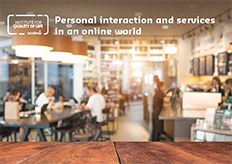Personal interaction and services in an online world
The way we find, book, pay for, receive, evaluate and therefore experience services has changed beyond recognition, in particular with the development of online platforms.
A democratization of services is also being driven by technology and ever-increasing transparency. In some ways, the offline world has shrunk as we can access people and information with unprecedented ease. By contrast, the online world continues to expand. What is the essence of ‘service’ in an increasingly hybrid marketplace of on and offline services?
The Sodexo Institute for Quality of Life held a round-table ‘Dialogue’ in Mumbai drawing on experience from business and knowledge from academic disciplines including marketing, semiotics, anthropology and social psychology to consider:
- technological advances, changing perceptions and experiences of service,
- the relative value of on and offline service experiences,
- the role of human interaction in service experiences,
- trade-offs between on and offline service experiences.
If we are willing to look beyond a false online / offline dichotomy, consider the essence of service and the role of notions such as identity, choice and trust, personal interaction and an online world are not necessarily at odds with each other.
Who serves, the form in which service is delivered and to whom it is given can say a lot about the relationships involved, including the distribution of power or control. Service relationships are also underpinned by notions of identity, choice and trust. In particular:
- in a hybrid online / offline world, the notion of identity in relation both to the provider and the consumer changes as we move between platforms,
- genuine choice is based on a number of alternatives that the consumer can reasonably contemplate and evaluate. One of the facilitators of choice is personal interaction whereby service provider and consumer develop a common understanding of criteria and options. Technology-enabled services may not seek or be able to replicate genuine intimacy but may instead support decision-making through alternative means,
- trust underpins service with sense, dignity and integrity for mutual benefit and peace of mind. In services and personal interaction, trust can be based on a variety of factors such as proximity, authenticity, time or repetition of experience and feedback. The notion of trust takes us beyond a binary online versus offline dichotomy and the method of service delivery.
Download the report (PDF)
Download the executive summary (PDF)
Download the infographic (PDF)



